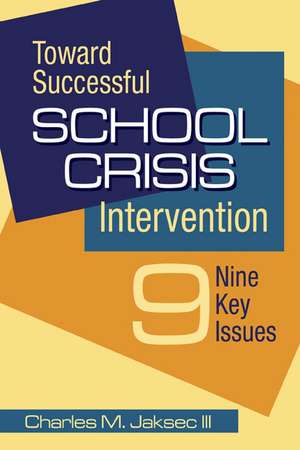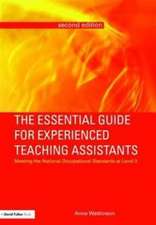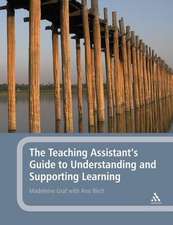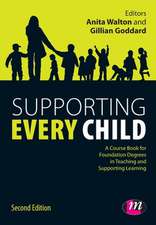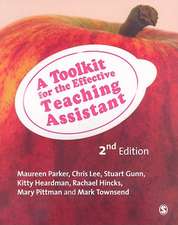Toward Successful School Crisis Intervention: 9 Key Issues
Autor Charles M. Jaksecen Limba Engleză Paperback – 9 iul 2007
| Toate formatele și edițiile | Preț | Express |
|---|---|---|
| Paperback (1) | 207.94 lei 6-8 săpt. | |
| SAGE Publications – 9 iul 2007 | 207.94 lei 6-8 săpt. | |
| Hardback (1) | 483.44 lei 6-8 săpt. | |
| SAGE Publications – 9 iul 2007 | 483.44 lei 6-8 săpt. |
Preț: 207.94 lei
Nou
Puncte Express: 312
Preț estimativ în valută:
39.79€ • 41.55$ • 32.86£
39.79€ • 41.55$ • 32.86£
Carte tipărită la comandă
Livrare economică 15-29 aprilie
Preluare comenzi: 021 569.72.76
Specificații
ISBN-13: 9781412948883
ISBN-10: 1412948886
Pagini: 128
Dimensiuni: 152 x 229 x 8 mm
Greutate: 0.21 kg
Ediția:1
Editura: SAGE Publications
Colecția Corwin
Locul publicării:Thousand Oaks, United States
ISBN-10: 1412948886
Pagini: 128
Dimensiuni: 152 x 229 x 8 mm
Greutate: 0.21 kg
Ediția:1
Editura: SAGE Publications
Colecția Corwin
Locul publicării:Thousand Oaks, United States
Recenzii
"An important topic for everyone involved in education. This quick reference guide will help educators plan for a crisis before it happens."
"The author is an experienced crisis intervener and the book has a refreshing, conversational tone."
"Written by a longtime school social worker and crisis intervention team member who uses this experience to address nine topics readers can use to manage crises. Perfect for teachers and educator administrators alike."
"Merits the attention of a wide array of school-based professionals because it provides sound information in a user-friendly manner. Thought-provoking discussion questions are available, making this book a resource for the training of interventionists as well as for strengthening existing crisis plans."
"An invaluable tool for staff and faculty members who make up institutional crisis committees as well as those who are the first-line defense against crises that are a reality in our schools."
"The author is an experienced crisis intervener and the book has a refreshing, conversational tone."
"Written by a longtime school social worker and crisis intervention team member who uses this experience to address nine topics readers can use to manage crises. Perfect for teachers and educator administrators alike."
"Merits the attention of a wide array of school-based professionals because it provides sound information in a user-friendly manner. Thought-provoking discussion questions are available, making this book a resource for the training of interventionists as well as for strengthening existing crisis plans."
"An invaluable tool for staff and faculty members who make up institutional crisis committees as well as those who are the first-line defense against crises that are a reality in our schools."
Cuprins
Acknowledgments
About the Author
Introduction
1. The Responsibility for School Crisis Intervention: Whose Job Is This, Anyway?
Who Should Provide Crisis Intervention?
Reasons for Reluctance
Eager to Help But Unprepared
Helpful Tips
Questions for Discussion
2. Necessary Attributes and Abilities for Team Members: What Does It Take?
Attributes for Handling a Crisis
Abilities in Handling a Crisis
Helpful Tips
Questions for Discussion
3. Training of School Crisis Intervention Team Members: Going to War Without a Weapon?
When Training Is Inadequate
How Are School Crisis Interventionists Prepared?
Preservice Training
Inservice Professional Development
Tips for Training Inadequately Prepared School Crisis Intervention Teams
Evaluating the Effectiveness of the Training
Helpful Tips
Questions for Discussion
4. Logistical School Crisis Response: The Overlooked Intervention
Organized Response Is the Difference Between Sucess and Failure
Developing a Logistical Plan of Action
Helpful Tips
Questions for Discussion
5. Determining the Impact of a Crisis: How Big Will the Bang Be?
Looking Before You Leap
Assessing Impact Variables
Determining the Scope of the Crisis
Awareness of the Number of Crises a School Has Suffered
Availability of Support Staff
Location and Time of the Crisis
The Immediacy of the Crisis
Identifying Who Has Been Affected by the Crisis
Three Critical Questions to Address Impact Effectively
Helpful Tips
Questions for Discussion
6. Non-School-Based Crisis Intervention Teams: Districts and Schools Working Together
The Make Up of District-Level Teams
Advantages and Disadvantages of District-Level Crisis Intervention Teams
Three Guidelines for Non-School-Based/District Crisis Teams
Helpful Tips
Questions for Discussion
7. Teachers: The Overlooked Interventionists
What Prevents Teacher Involvement in Crisis Intervention?
The Provision of In-Class Crisis Intervention
The Case for Teachers as Crisis Interventionists
Administrative Steps for Teacher Inclusion in Crisis Intervention Activities
Helpful Tips
Questions for Discussion
8. Did We Forget Anyone? Addressing the Needs of Every Staff Member
Why Faculty Members Don't Always Receive Support
Helpful Tips
Questions for Discussion
9. Primary Prevention: Preparing for Crises Before They Happen
The First Level of Intervention Is Prevention
Why Don't Schools Usually Engage in Primary Prevention?
The Benefits of Primary Prevention
Misconceptions About a Preventive Approach
Looking Forward
Helpful Tips
Questions for Discussion
Conclusion
Resources
Common Questions and Helpful Answers About Group Counseling Sessions
References
About the Author
Introduction
1. The Responsibility for School Crisis Intervention: Whose Job Is This, Anyway?
Who Should Provide Crisis Intervention?
Reasons for Reluctance
Eager to Help But Unprepared
Helpful Tips
Questions for Discussion
2. Necessary Attributes and Abilities for Team Members: What Does It Take?
Attributes for Handling a Crisis
Abilities in Handling a Crisis
Helpful Tips
Questions for Discussion
3. Training of School Crisis Intervention Team Members: Going to War Without a Weapon?
When Training Is Inadequate
How Are School Crisis Interventionists Prepared?
Preservice Training
Inservice Professional Development
Tips for Training Inadequately Prepared School Crisis Intervention Teams
Evaluating the Effectiveness of the Training
Helpful Tips
Questions for Discussion
4. Logistical School Crisis Response: The Overlooked Intervention
Organized Response Is the Difference Between Sucess and Failure
Developing a Logistical Plan of Action
Helpful Tips
Questions for Discussion
5. Determining the Impact of a Crisis: How Big Will the Bang Be?
Looking Before You Leap
Assessing Impact Variables
Determining the Scope of the Crisis
Awareness of the Number of Crises a School Has Suffered
Availability of Support Staff
Location and Time of the Crisis
The Immediacy of the Crisis
Identifying Who Has Been Affected by the Crisis
Three Critical Questions to Address Impact Effectively
Helpful Tips
Questions for Discussion
6. Non-School-Based Crisis Intervention Teams: Districts and Schools Working Together
The Make Up of District-Level Teams
Advantages and Disadvantages of District-Level Crisis Intervention Teams
Three Guidelines for Non-School-Based/District Crisis Teams
Helpful Tips
Questions for Discussion
7. Teachers: The Overlooked Interventionists
What Prevents Teacher Involvement in Crisis Intervention?
The Provision of In-Class Crisis Intervention
The Case for Teachers as Crisis Interventionists
Administrative Steps for Teacher Inclusion in Crisis Intervention Activities
Helpful Tips
Questions for Discussion
8. Did We Forget Anyone? Addressing the Needs of Every Staff Member
Why Faculty Members Don't Always Receive Support
Helpful Tips
Questions for Discussion
9. Primary Prevention: Preparing for Crises Before They Happen
The First Level of Intervention Is Prevention
Why Don't Schools Usually Engage in Primary Prevention?
The Benefits of Primary Prevention
Misconceptions About a Preventive Approach
Looking Forward
Helpful Tips
Questions for Discussion
Conclusion
Resources
Common Questions and Helpful Answers About Group Counseling Sessions
References
Notă biografică
Descriere
Prompts crisis intervention team members to reevaluate their beliefs and practices, and offers illustrative vignettes, helpful tips, and discussion questions to guide reflection and action.
